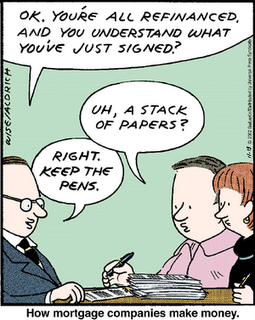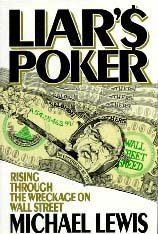Where do mortgages go?
 If you own your own home, or some investment homes, you have probably received notice (possibly multiple times) that your mortgage is being sold. Sold? Who would want my mortgage? What are they going to do with it? Am I going to get screwed in the deal?
If you own your own home, or some investment homes, you have probably received notice (possibly multiple times) that your mortgage is being sold. Sold? Who would want my mortgage? What are they going to do with it? Am I going to get screwed in the deal?
I'll explain where your mortgage is going, but first I'll address a common concern that people have with mortgages and their sales.
When your mortgage is sold, the terms of the mortgage do not change
If my mortgage, created by USAA, is sold to, say Lehman Brothers (an investment bank), the terms that USAA creates transfer with your mortgage. Lehman Brothers won't change the interest rate (if you had an ARM, they'll only change it according to the original terms). They can't change the payment schedule. They cannot change a single thing about your mortgage.
"But", you cry, "when my mortgage was sold they sent me a notice telling me to pay more money!". When most people make a mortgage payment, they usually pay money to an escrow account instead of the bank. This escrow account then doles out the money to several creditors, including the government (for your property taxes), the insurance company (your home premiums), and the bank (interest and principal). When your mortgage is sold, these accounts are often reviewed, and sometimes you can come up a little bit short (if your taxes increase, for instance). This can also happen if you mortgage isn't sold, but the mortgage loan itself always remains the same.
So what happens to the mortgage when it's sold?
First let me explain what a bond is. A bond is essentially a loan. When a company (like General Motors) needs some money to build a new factory, they create a new bond and trying to sell it (it's a giant I-O-U). The buyers of the bond give GM a very large sum of money and in return GM pays that money back, with interest, on a regular schedule. Does this sound familiar to you? Sounds awfully similar to a mortgage to me...
Bonds are a big business on Wall Street. People are constantly buying and selling them, just like stocks. Their values go up and down according to the interest rate benchmarks. For a hypothetical example, that GM bond you bought last year that pays 5% is worth less today because the interest rates rose to 6%. Essentially, by buying a bond issued today (at 6%) you can get a better return then by buying a bond that only pays 5%, therefore the old bond isn't worth as much. On the other hand, if interest rates drop your bond becomes more valuable. So the values of bonds go up and down and people trade them just like stocks.
Let's look at a fictional bank, the Bank of Value, which has $1,000,000. The Bank of Value ends up giving out 10 mortgages, each for $100,000 at 6%. That's not a bad deal, and the Bank of Value will earn almost $60,000 in the first year. Not a bad investment, and it'll provide the Bank with some decent cash flow over the next 30 years. But the Bank of Value isn't in the business of waiting for cash flow, it's in the business of making loans. However, since they have loaned out all of their money, they can't make any more loans.
So what the Bank of Value does is take the ten loans and put them together into a sort-of-bond. No one wants to buy a $100,000 bond, that's too small an amount of money for a big investor to care about. They normal trade in the millions and billions of dollars. But when you put 10, 20, or even 100 mortgages together, you get a very big sort-of-bond.
Mortgage-backed securities (bonds) tend to be bought by larger investors like pension funds. The pensions have money today (from their employee contributions) and need more money tomorrow (to pay back the employees when they retire). The banks have money tomorrow (which will be paid back by the home owners over 30 years), but need money today (to make more loans). Mutual Funds are another major investor in mortgages.
So the Bank of Value now takes it's sort-of-bond and sells it to a pension fund for $1,100,000. The bank is happy, because now they have made a nice profit and can make more loans. The pension fund is happy, because they will be getting 6% over the next 30 years, not a terrible return. The Bank takes their $1,100,000 and now make 11 new mortgages, and the entire process starts all over again.
nice profit and can make more loans. The pension fund is happy, because they will be getting 6% over the next 30 years, not a terrible return. The Bank takes their $1,100,000 and now make 11 new mortgages, and the entire process starts all over again.
And that's why your mortgage is sold. It gets the loans to the people who want them (so they can get money over a long period of time) while freeing up more money to be lent for tomorrow's home buyers.
If this subject interests you, I highly recommend that you check out Liar's Poker, a very amusing tale about Wall Street during the 80's, with a large section talking about how mortgages became one of the hottest securities on the market.
1 comment:
Great readingg your blog post
Post a Comment